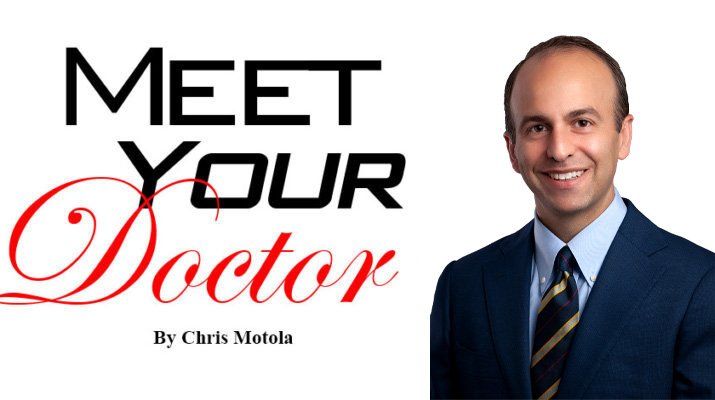New robotic surgeon at St. Joe’s specializes in minimally invasive hernia and gall bladder surgeries, and wound healing: ‘Robotics has been a real asset in making things better for both the patient and the surgeon,’ he says
By Chris Motola
Q: When did you join St. Joe’s?
A: I officially started in August.
Q: How do you like it so far?
A: It’s been great. I’m from Vestal and my wife is from Albany. With training and residency and previous jobs we’ve been looking for a place to call home. This came up for me, so it’s been nice for us both to be close to family. I’ve worked other places — I’m not that far out from graduation — in Philadelphia, Staten Island and Oregon and can absolutely say that St. Joe’s is such a high-quality organization. Everybody is so professional. The medical staff is cutting edge. It’s inspiring to go in with these people because they inspire you to bring your best. It’s great to be able to call this home.
Q: You’re a general surgeon who specializes in robotic surgery. What types of surgeries do you perform most often?
A: Anything I can do minimally invasive and robotic, I like to do it that way. I do a lot of hernias and gall bladders.
Q: What kind of positive effects on outcomes do you see for those types of surgeries?
A: The nice thing with doing things minimally invasive, especially with the robot, is that people usually seem to have less pain and can get back to their activities more quickly. This assumes it’s the right thing for them and is appropriate for the surgery. When we can do it that way, we like to. Less pain, less pain medicine, less time away from the things they like to do. And it’s beneficial for both the easy stuff like hernias and the more complicated procedures.
Q: What’s involved in repairing a hernia?
A: A hernia is a hole where it shouldn’t be. What I tell folks is you end up with that hole and things either stretch out and cause you pain or things can start to push through, either fat or intestines. It can get stuck or caught, which then lands you in the emergency room. That’s why we usually tell people to come in and get checked out. If we find them or your primary care physician finds them it’s good to take care of it when it’s small and easy.
Q: Are repairs usually permanent?
A: What I usually tell people is that fixing a hernia is intended to be a permanent fix. There certainly is a risk of things coming back and causing trouble down the line. It’s a combination of closing it with stitches and using a piece of mesh to reinforce everything, which decreases the risk of recurrence. There are different kinds of mesh. So we try to make sure it’s the right surgery and appropriate kind of mesh for the repair so that it will hopefully be permanent.
Q: In what ways does osteopathic education inform your approach to surgery?
A: When I was in school, I had the same broad-based education as everyone else, but we had more of a focus on musculoskeletal medicine and manipulation labs. I don’t currently practice manipulation, but I do think studying the musculoskeletal system may have given me a slightly different perspective on surgery. You can get a great outlook without osteopathic training, but for me I think taking into consider the broader context of the pathology and other things that may be going on with that person. It informs some of the ways I approach disease, surgery and treating people in general.
Q: I hear you also have some specialization in wound care.
A: I had some experience in the past working in a wound care center. It was a great experience seeing things you don’t always see in general surgery. I got to know patients with long-term problems pretty well, getting their dressings changed. You get to know them over time. That was in Philadelphia.
Q: Where do you see surgery advancements going?
A: Robotics has been a real asset in making things better for both the patient and the surgeon, and a lot more of us have experience with it now and can talk to colleagues about it. And patients like to know they’re getting cutting edge technology that is also well-established.
Lifelines
Name: James J. Giannone, D.O.
Hometown: Vestal
Education: Doctor of Osteopathic Medicine from New York College of Osteopathic Medicine in Old Westbury; Master of Science certification from New York Institute of Technology, New York City; Bachelor of Science in biology (with honors) from Bucknell University in Lewisburg, Pennsylvania. Completed internship and general surgery residency at Philadelphia College of Osteopathic Medicine, Philadelphia; completed an advanced GI/MIS fellowship at the Richmond University Medical Center, Staten Island
Affiliations: St. Joseph’s Hospital Health Center
Organizations: American College of Surgeons, American College of Osteopathic Surgeons, Society of American Gastrointestinal and Endoscopic Surgeons
Family: Wife (Katie, a physician)
Hobbies: Running, hiking, spending time with his dog

